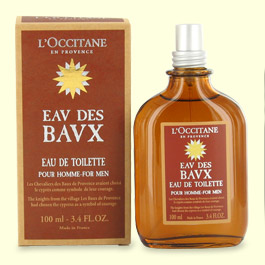
I really like this companys stuff it all natrual no garbage in there produduts and they smell wonderfull. I really like the "Eve Des Bavx" DESCRIPTION In Provence, the knights from the village of Les Baux chose the cypress tree as a symbol of their strength and honor, and a bright star in the sky as their guiding force. In honor of their courage, L'OCCITANE has created a sensual and mysterious blend of cypress and incense named Eau de Baux.
I think this is just a wonderfull company that really gets back at the junk that is made and called body care this stuff is just made with care and a passion for the best. Treat yourself to this fine compay. I have noticed that the cents affect you and can wake you up or calm you down.
L’OCCITANE is a unique brand focusing on the well-being of women and men alike. It seeks to create harmony which links the pleasure of the senses with inner balance. The products range from personal care lines to home fragrances. All are manufactured in the time-honored traditional way using fine natural ingredients, primarily from Provence.
Then...
The company was founded by Olivier Baussan in the south of France in 1976. The first shop and mail order service was opened in Volx, France, in 1980. The current factory in Manosque was established in response to an ever-growing distribution network. In the mid to late 1990s; subsidiaries were opened in the U.S., Hong Kong and the U.K.
...and now
Today, L’OCCITANE employs some 1200 people. In addition to mail order sales, there are some 500 L’OCCITANE stores in nearly 60 countries. All products and stores reflect the company's core values of authenticity, simplicity, sensory pleasure and respect for people and the planet. From simple, natural ingredients, L’OCCITANE creates products that serve the ultimate goal of well-being in ourselves and in our homes. The fragrances are varied, unusual, natural and wonderfully appealing.
The ranges
L’OCCITANE creates natural body, skincare and fragrance products for men, women and the home. All the product ranges are presented in traditional packaging that reflect the true elegance of simplicity. And all are produced according to strict ethical guidelines.
A true story
L’OCCITANE is true to itself and its founding principles. Authenticity and effective natural products designed to procure true well-being. True stories behind the development of our products. And true pleasure in their use.
“WOMEN'S GOLD”
Wherever you look in Bobo Dioulasso, your eyes fall on majestic Shea trees that have always supplied the precious butter used in this part of West Africa. Because the trees are sacred, it is forbidden to pick the fruit, so it can only be collected from the ground. The secret for preparing Shea Butter is strictly reserved for the women. They are also the only ones to benefit from its trade, which is why it is called “Women’s Gold”. Shea Butter protects the skin against the sun as well as the hot winds carrying dust and fine sand that dry the skin. Thanks to precious Shea Butter, the women of this region protect, nourish and moisturize* their skin.
STRAIGHT FROM THE SOURCE
L’OCCITANE’s Shea Butter range brings these same benefits to the face, hair and body in products that contain a high percentage of Shea Butter, which is particularly recommended for dry and very dry skin. The women of Burkina Faso harvest the Shea fruit, extract and dry the nuts, grind them to make a fine paste and transform the paste into Shea Butter – a universal and irreplaceable beauty care product.
Orange flowers glow in the lush greenery…
I have never distilled orange flower water because the orange tree cannot resist the harsh climate of Haute-Provence, more suited to aromatic plants. But these trees have always fascinated me.
Maybe it has something to do with the now very distant memory of those rare fruits that we used to get for Christmas, wrapped in individual squares of tissue paper with cheerful and naïf designs. Or those little lamps we used to make for the Christmas dinner table with a candle stub inside the topped orange skins. Or those aromatic pomanders spiked with cloves that added a spicy fragrance in our houses throughout the year.
The orange tree is more fragile than the olive or almond tree and prefers a coastal environment. Although it made the reputation of the town of Grasse, very few orange groves are still cultivated in the region and the production of essential oil is rare. Orange flowers are now harvested for the perfume industry mainly on the other side of the Mediterranean, in Egypt and in Tunisia, not far from Carthage.
There are different varieties of orange trees. The sweet orange tree produces the Christmas fruit, while the species most valued for its essential oil is the bitter orange tree, also called the Seville orange tree. The essence of orange flower water is obtained from its first flowers in April.
The flowers are harvested very early in the morning, before the sun’s heat affects their freshness, and gathered in canvas bags. They are then distilled on the same day in order to preserve their full fragrance, producing an essence so smooth and delicate, that it was called after a famous Italian aristocratic beauty of the 16th century called princess of Nerola.
The orange flower water from the Neroli distillery sustained the reputation of the Grasse region for many long years. This precious, soothing and refreshing water has been used for thousands of years on the eastern side of the Mediterranean to wash the hands of honoured guests before meals, in a timeless ritual of welcome and respect.
Discover L'Oranger
But the orange tree gives us more than its spring blossoms. The peel of its small green fruits and its leaves are used to produce an essential oil called “petit grain”, whose fragrance is sharper and more fruity and which is mainly used in the manufacture of eaux de Cologne and soaps.
In autumn, the orange tree’s second blooming produces flowers with less essence, which are used to make bouquets and the traditional orange blossom circlets of young brides. Throughout the Mediterranean region, the tree’s white blossoms are regarded as a symbol of purity.
The flowers that are not plucked produce the fruits of the winter. The people of Grasse many years ago used to turn the thick peel inside out to make little jewellery caskets and sweet boxes, some of which are on view in the town’s perfume museum. I thought that this tradition had completely died away, but recently I came across the work of craftsmen who still make these fragile and precious boxes. Guess where? In California!
So this know-how has not been lost, after all, and is still being enriched, as are many other precious and useful products of the orange tree!
Olivier Baussan


No comments:
Post a Comment